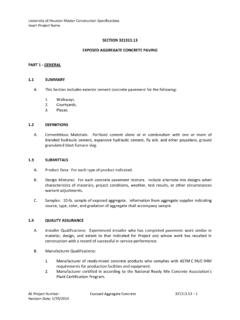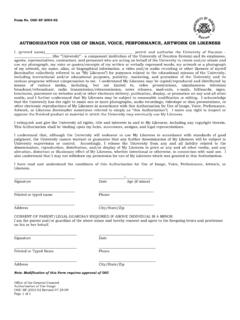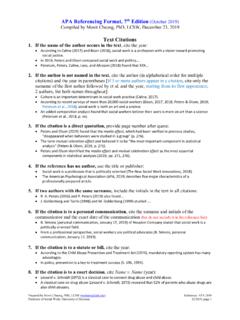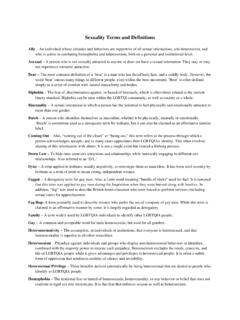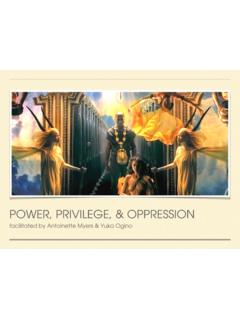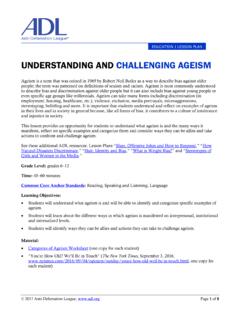Transcription of Homophobia
1 LGBT Resource Center 5/2010 Homophobia " Homophobia : The fear of feeling of love for members of one's own sex and therefore the hatred of those feelings in the belief in the inherent superiority of one pattern of loving and thereby its right to dominance." Audre Lorde, Sister Outsider. Freedom, California: The Crossing Press, 1984. Homosexuality is not a problem. The real issue is Homophobia the many ways in which people are oppressed on the basis of sexual orientation and affectional preference. In many cultures, same sex eroticism is socially accepted as part of the normal range of human behavior. But in our society, many people believe that sexual contact between men is sick and immoral, and either nonexistent or impossible. HOW DO YOU RECOGNIZE Homophobia IN YOURSELF AND OTHERS?
2 There are four distinct but interrelated types of Homophobia : personal, interpersonal, institutional, and cultural. Personal ( internalized ) Homophobia is prejudice based on a personal belief that lesbian, gay and bisexual people are sinful, immoral, sick, inferior to heterosexuals, or incomplete women and men. Personal Homophobia is experienced as feelings of fear, discomfort, dislike, hatred, or disgust with same sex sexuality. o Anyone, regardless of their sexual orientation or preference, can experience personal Homophobia ; o when this happens with LGBTQ people, it is called internalized Homophobia . Like heterosexuals, lesbians, gays, and bisexuals are taught that same sex sexuality is inferior to heterosexuality, and many internalize this to the point where self acceptance is difficult. One result of this is that some LGBTQs desperately try to deny or change their sexual orientation; and some have tried or succeeded in committing suicide.
3 Interpersonal Homophobia is individual behavior based on personal Homophobia . This hatred or dislike may be expressed by name calling, telling "jokes, verbal and physical harassment, and other individual acts of discrimination. Interpersonal Homophobia , in its extreme, results in LGBTQs being physically assaulted for no other reason than their assailants' Homophobia . Most people act out their fears of LGBTQ people in nonviolent, more commonplace ways. o Relatives often shun their LGBTQ family members; o coworkers are distant and cold to LGBTQ colleagues; o heterosexual friends aren't interested in hearing about their LGBTQ friends' relationships. LGBT Resource Center 5/2010 Institutional Homophobia refers to the many ways in which government, businesses, churches, and other institutions and organizations discriminate against people on the basis of sexual orientation.
4 Institutional Homophobia is also called heterosexism. Institutional Homophobia is reflected in religious organizations which have stated or implicit policies against lesbians, gays, bisexuals, and transgenders leading services; agencies which refuse to allocate resources for services to LGBTQ people; and governments which fail to insure the rights of all citizens, regardless of their sexual orientation. Cultural Homophobia refers to social standards and norms which dictate that being heterosexual is better or more moral than being LGBTQ, and that everyone is or should be heterosexual. Cultural Homophobia is also called heterosexism. Cultural Homophobia is spelled out each day in television shows and print advertisements where virtually every character is heterosexual, every erotic relationship involves a female and a male, and every "normal" child is presumed to be attracted to and will eventually marry someone of the other sex.
5 In the few cases where LGBTQ are portrayed, they are usually unhappy, stereotyped, engaged in self destructive behaviors, or ambivalent about their sexual orientation. WHAT ARE THE CAUSES OF Homophobia ? Personal ( internalized ) Homophobia (prejudice) is primarily caused by misinformation. o As with racism and sexism, people are taught to be homophobic. o Myths about LGBTQ people are perpetuated in our society despite the availability of accurate information. Few children are given any unbiased information about LGBTQ people; many adults continue to believe the stereotypes they learned as children; and some religious and conservative organizations promote lies about lesbian, gay, and bisexual people. Interpersonal Homophobia (harassment and individual discrimination) can be explained by considering psychological factors in conjunction with prejudice.
6 O People who are not comfortable with their own sexuality, or who feel threatened by same sex sexuality, tend to be more rigid about what is sexually "right" and may try to punish or force their beliefs on LGBTQ people. Institutional Homophobia is caused in part by competition for power. Societies such as our create scapegoats to maintain the status quo and the positions of those in power. LGBT Resource Center 5/2010 o During this century, groups such as Jews, African Americans, Asian Americans, Latin Americans, American Indians, women and LGBTQ people have all been blamed for a variety of social and economic problems. o When scapegoating is successful, dominant groups don't need to take responsibility for injustice or give up privilege. Cultural Homophobia is largely caused by social norms which dictate "correct" sexuality. o Sexual contact between women, and between men, has been practiced in all societies throughout history and is openly accepted in many cultures.
7 O But Western civilization is generally repressive of sexuality in any form, other than intercourse necessary for procreation or sexual activity in the context of heterosexual marriage. Therefore, same sex sexuality will certainly be feared or damned. CAN Homophobia BE CURED? Homophobia is pervasive in this and many other societies. Because we are all products of our society, most of us are homophobic, regardless of our sexual orientation. Assume that you are homophobic. Dealing constructively with Homophobia first requires an acknowledgment of its pervasive existence. We cannot easily eradicate our homophobic feelings, but if we are willing to acknowledge that we are all homophobic, then we can begin to take responsibility for our choices and change our behaviors. In addition to assuming the ever presence of Homophobia , we can do the following: Identify Homophobia , not homosexuality, as the problem to be addressed.
8 In conversations with friends and colleagues, speak out about Homophobia . For many people, the only time that they talk about LGBTQ people is in the context of homophobic "jokes." Think about the similarities and differences between Homophobia and other forms of oppression. Use what you know about racism , sexism, classicism, etc., to better understand Homophobia and to look for ways to respond to Homophobia . Listen to the experiences of LGBTQ people and assume that their experiences with oppression is valid. Similarly, assume that the ways in which LGBTQ people experience the world are different from the ways in which heterosexuals experience the world. Actively support anti discrimination efforts, as well as campaigns to stop homophobic prejudice and violence. Written by Cooper Thompson and Barbara Zoloth Copyright The Campaign to End Homophobia , 1990 LGBT Resource Center 5/2010 How Homophobia Hurts us All You do not have to be gay, lesbian, or bisexual, or know someone who is, to be negatively affected by Homophobia .
9 Though Homophobia actively oppresses gay men, lesbians, and bisexuals, it also hurts heterosexuals. Homophobia inhibits the ability of heterosexuals to form close, intimate relationships with members of their own sex, for fear of being perceived as gay, lesbian or bisexual. Homophobia locks people into rigid gender based roles that inhibit creativity and self expression Homophobia is often used to stigmatize heterosexuals: those perceives or labeled by others to be gay, lesbian, or bisexual: children of gay, lesbian, or bisexual parents; parents of gay, lesbian, or bisexual children; and friends of gay men, lesbians, and bisexuals. Homophobia compromises human integrity by pressuring people to treat others badly, actions that are contrary to their basic humanity. Homophobia combined with sex phobia, results in the invisibility or erasure of gay, lesbian, or bisexual lives and sexuality in school based sex education discussion, keeping vital information from students.
10 Such erasures can kill people in the age of AIDS. Homophobia is one cause of premature sexual involvement, which increases the chance of teen pregnancy and the spread of sexually transmitted diseases. Young people, of all sexual identities, are often pressured to become heterosexually active to prove to themselves and to others that they are "normal." Homophobia prevents some gay, lesbian, and bisexual people from developing an authentic self identity and adds to the pressure to marry, which places undue stress and often trauma on themselves, as well as their heterosexual spouses and their children. Homophobia inhibits appreciation of the types of diversity, making it unsafe for everyone because each person has unique traits not considered mainstream or dominant. We are all diminished when any of us is demeaned. By challenging Homophobia , people are not only fighting oppression for specific groups of people, but also striving for a society that accepts and celebrates the differences in all of us.
